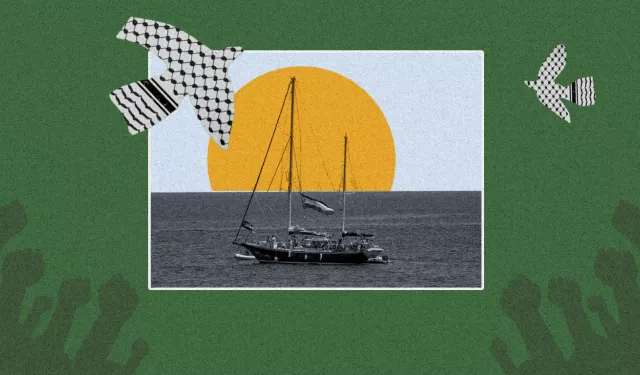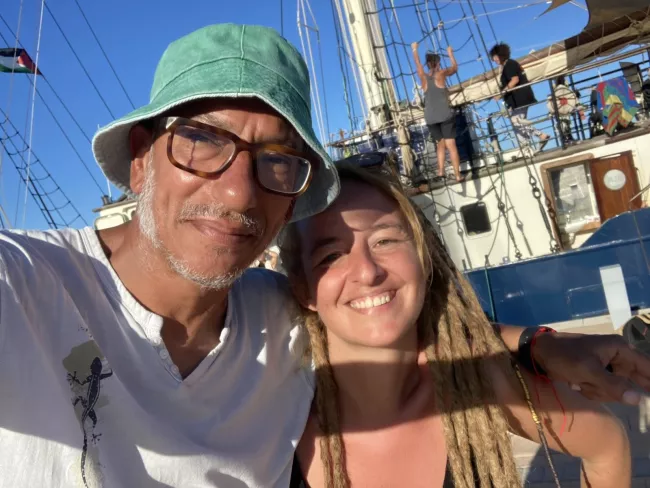
To Palestine| Fear, resistance, and a Catalana named Carol
Just a few hours before I began writing this dispatch from the Global Sumud Flotilla, our boat was shaken by a sudden and intense moment of fear. We had a nighttime accident—no need for details—that placed both our boat and another in real danger. The threat passed, but the panic and tension lingered before slowly fading away.
Ever since we announced our participation in this mission, whether as a group or individuals, the spotlight has been fixed on us. Interviews, statements, TV reports. The questions come in waves. But two questions keep re-surfacing: Why did you decide to join? Aren’t you afraid?
The first is about motivation. What drives someone to take a risk like this? The second assumes we’re all fearless heroes and that our supposed lack of fear makes us capable of action.
But that assumption is flawed. It ignores a simple truth: all human beings, whether actors or extras, experience fear. What matters is how we negotiate with it, how we stop it from controlling us or our tools, and how we outmaneuver it so we can keep going.
That ability depends on our sense of purpose. That inner compass that pushes each of us to act, to risk, to commit. Most of us have an urge to see ourselves as heroic. But in this case, there’s something more urgent than being seen as brave—something that matters far more than safeguarding the “heroes” who share this mission with me.
That thing is the mission itself: to stop the starvation and genocide being carried out against the people of Gaza. That requires shedding any heroic persona. We must not imagine ourselves as heroes. We must not be perceived as such. We are simply individuals who’ve become vessels to keep the world’s spotlight fixed where it belongs; on the Palestinian people.
This mission demands that we resist easy slogans. Like the one shared by a “star” of the flotilla during our Aug. 28 training, when asked if he’d be afraid during a possible Israeli army raid. He replied with certainty, “The only people who get scared are men who are too macho.”
That’s the kind of simplistic nonsense that erases a vital human feeling, not just for us, but for all living creatures: fear.
Carol’s tears
I met Carol in Barcelona before boarding the boat Yolara. She’s from Catalonia—Barcelona, to be exact. She and her partner are both in their mid-30s. Carol is a set designer; her partner is a firefighter. Both know their way around boats. They were among the hundreds of volunteers supporting us with logistics. Her partner was one of those picking up gear for mechanical and electrical repairs, while Carol focused on getting the needed food and drinks for us on the boats.
We said goodbye to Carol and her partner in Barcelona. We reached Tunisia—only to find out they’d taken time off work to continue volunteering in a country they didn’t know, whose language they didn’t speak.
From the moment I met Carol, we had a strong connection. She asked me to be her assistant in gathering supplies for the boats.
The chaos of the port, the urgency of our tasks, and the absence of real coordination from some of the teams led Carol to a quiet corner of the pier, where I found her crying alone. I sat with her. I’ll write more about Carol, and others like her, once this is over. But for now, amid the noise of Yolara and the passengers aboard, I want to say just one thing: Carol refuses to forget the genocide in Gaza.
She follows the ongoing displacement of Palestinians. She sees echoes of it in her own life. Her mother spent 20 years paying off a mortgage, hoping to protect her daughters from eviction. And yet, a few years ago, the bank took the house and forced all three women, Carol, her sister, and their mother, onto the street.
Carol never compares her experience to what Palestinians are living through. She knows the difference in scale. But she draws strength from her personal pain. It fuels her.
In the face of the cameras, the headlines, the egos that balloon when people feel like heroes, Carol checks the news from Gaza each day to remind herself why she’s doing this. Not for us. For them.
I cried listening to Carol. She cried too. The soft kind of crying I’ve done often in recent weeks, and mostly in private. One night, during a pitch-black shift on the boat, I found myself returning to that question of inner compass. What gives me the tools to outwit fear, and to keep going?
It’s not my knowledge of the history of the Arab-Israeli conflict, or of the Palestinian cause, or the solidarity movement, or even the latest news from Gaza that gives me a sense of purpose right now.
What helps me now are other things: my mischief, my rebellion, the support I feel from Egyptians and Arabs everywhere. My roots in Egypt’s leftist movement and its history. My family’s values—leftist, Egyptian, pro-Palestine—since the 1950s. The student movement of the early ’90s, when we went to jail together for Palestine.
I try to summon the mental and emotional energy from that time, to prepare myself for what’s ahead.
These are my tools. My compass. And I carry other pieces with me too. The protests across Spain, where I mostly live. The images from around the world. A sense that I am returning to Palestine, to those I met in 2006 while filming “Swings/Marajeeh”.
I try to revive the simplicity of our struggle in the early ’90s fused with all the other moments that shaped me. I sing the songs we used to sing in Ain Shams University, in prison, or while walking Cairo streets at night.
During that blacked-out night on board days ago, I sang one of those songs. One we used to sing with our friend Mustafa Mohamed. The lyrics were by our friend, the poet Ibrahim Abdel Fattah, whom I hadn’t yet met at the time.
“Ya sabah ya abu alb nadi/Oh morning, you with the tender heart.”
I remembered the exact words, and they gave me what I needed.
They reinstated me, returned me to my compass, and to the warmth of old comrades so I could outmaneuver the fear that is now my companion.
This story is from special coverage file To Palestine| We sail, and your hearts sail with us
Sailing to Gaza, we wanted you with us Mr. Chaplin
As thousands gather to see us off at Barcelona’s docks, Chaplin’s spirit echoes. Marching or sailing for Palestine is defending life, children, humanity, and our future.
To Palestine| Messages from the sea
No one should have to travel from the western Mediterranean to the east just because the fascist state is committing genocide against the Palestinian people.
To Palestine| Paths of departure, routes of return
Yousef’s family fled Palestine on foot in 1948. Now, aboard the Global Sumud Flotilla, he attempts his first symbolic return, by sea, towards a homeland he’s never seen.
To Palestine| How can we recover from loving Tunisia?
From Sidi Bou Said to Gaza, Basel Ramsis writes of love, blood, and solidarity. On board the Sumud Flotilla, the journey resumes. Tunisia behind, Palestine ahead.
To Palestine| Fear, resistance, and a Catalana named Carol
It’s not my knowledge of the Arab-Israeli conflict, or of the Palestinian cause or even the latest news from Gaza that gives me a sense of purpose right now.
To Palestine| From boats of death to boats against death
The Senegalese migrant Serigne Mbayé Diouf joins the Global Sumud Flotilla, risking his life in a boat again, this time to stand with Palestinians in Gaza.
To Palestine| From Bahrain to Gaza carrying a father’s legacy
A Bahraini activist sails for Gaza, carrying his father’s legacy while passing it on to his sons, Salman and Salam.
To Palestine| Sailing through fear, carried by hope
As the Sumud Flotilla nears Gaza, Basel Ramsis writes of fear, resolve, and a global movement sailing not just toward Palestine—but against silence, siege, and surrender.
Published opinions reflect the views of its authors, not necessarily those of Al Manassa.

